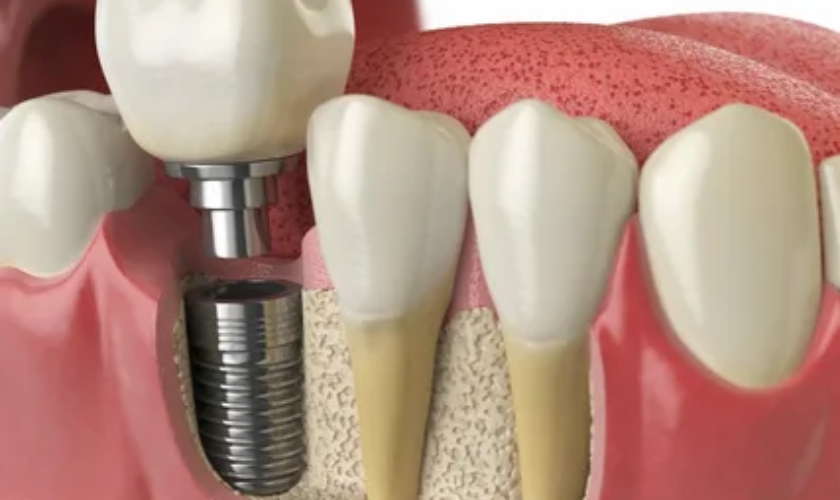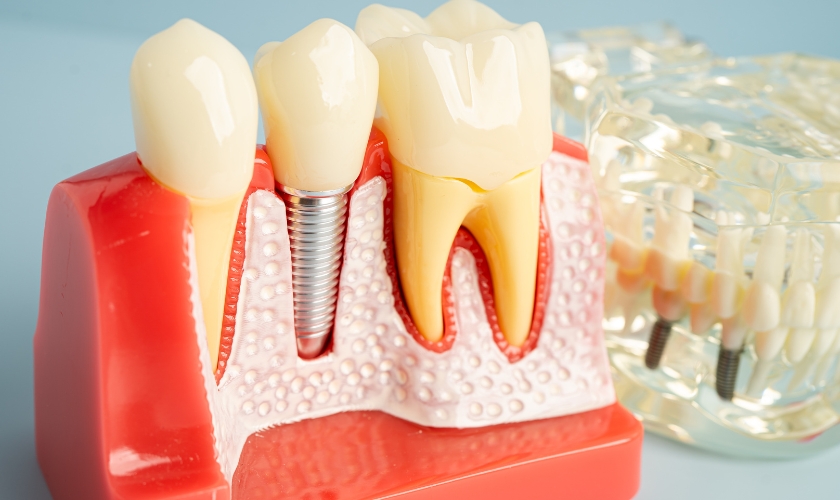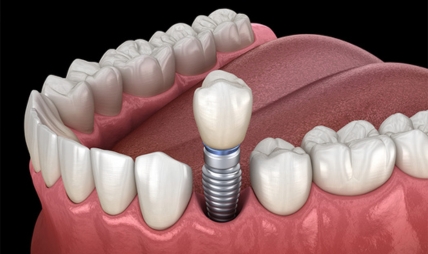8092 Edwin Raynor Blvd # D, Pasadena, MD 21122

Dental implants can transform your smile and improve your quality of life. However, their success depends significantly on how well you care for them. With proper maintenance, you can ensure that your implants last for many years. In this blog, we will explore essential dental implant care tips that can help you maintain your implants effectively.
What Are Dental Implant Care Tips?
Daily Oral Hygiene
Keeping your mouth clean is crucial for the longevity of your implants. Here are some easy dental implant care tips to maintain good oral hygiene:
- Brush Twice Daily: Use a soft-bristled toothbrush and fluoride toothpaste. Brush your teeth gently but thoroughly, including the areas around your implants.
- Floss Regularly: Flossing removes food particles and plaque between teeth and around implants. Consider using a floss threader or a water flosser to make the process easier.
- Mouthwash: Rinse with an antibacterial mouthwash to help kill bacteria. This step adds an extra layer of protection for your implants.
- Tongue Cleaning: Don’t forget to clean your tongue! A tongue scraper or your toothbrush can help remove bacteria and improve your breath.
By following these daily hygiene practices, you create a healthy environment for your implants, reducing the risk of complications.
Regular Dental Checkups
Frequent visits to your dentist are vital for maintaining your implants. These checkups can help catch potential issues early. Here’s why they matter:
- Professional Cleaning: Your dentist can perform thorough cleanings that reach areas you might miss. This helps prevent gum disease, which can affect the health of your implants.
- Monitoring for Issues: Regular checkups allow your dentist to monitor the condition of your implants and surrounding tissues. This early detection can save you from costly repairs down the line.
- Customized Advice: Your dentist can offer tailored advice based on your oral health. This might include specific cleaning techniques or products that suit your needs.
Aim for at least two dental checkups each year. These appointments are essential for the health and longevity of your dental implants.
Healthy Lifestyle Choices
Your overall health plays a significant role in how well your dental implants fare. Adopting a healthy lifestyle can enhance the success of your implants. Here are some tips:
- Balanced Diet: Consume a variety of nutrient-rich foods. Calcium and vitamin D are particularly important for bone health. Foods like dairy products, leafy greens, and fatty fish can be beneficial.
- Stay Hydrated: Drinking plenty of water helps keep your mouth moist and aids in rinsing away food particles. Proper hydration also supports overall health.
- Avoid Smoking: Smoking can lead to complications, such as implant failure. If you smoke, consider quitting to improve your oral health and overall well-being.
- Limit Sugary Foods: Reduce your intake of sugary snacks and beverages. Sugar can lead to plaque buildup and increase the risk of cavities around your implants.
Making these healthy choices will benefit not only your implants but your overall health as well.
Protecting Your Implants
Taking steps to protect your dental implants can prevent damage. Here are some strategies to consider:
- Wear a Mouthguard: If you play sports or grind your teeth at night, a mouthguard can help protect your implants from impact and pressure.
- Avoid Hard Foods: Steer clear of hard foods, such as ice or hard candies, which can put excessive strain on your implants. Choose softer foods to protect your dental work.
- Don’t Use Your Teeth as Tools: Avoid using your teeth to open packages or bottles. This habit can damage your implants and natural teeth.
By protecting your implants, you ensure their durability and functionality for years to come.
Monitoring for Changes
Being aware of changes in your mouth is crucial for the health of your dental implants. Here are some signs to watch for:
- Pain or Discomfort: If you experience persistent pain around your implants, it’s essential to contact your dentist. Early intervention can prevent further complications.
- Gum Changes: Swelling, redness, or bleeding gums may indicate an issue. Monitor your gum health and seek help if you notice any changes.
- Loosening Implants: If your implants feel loose or unstable, schedule an appointment with your dentist immediately. This could signal a more serious problem that needs attention.
Caring for your dental implants is vital to their success and longevity. By following proper oral hygiene, attending regular dental checkups, making healthy lifestyle choices, protecting your implants, and monitoring for changes, you can enjoy your beautiful smile for years to come. Remember, a proactive approach is key to maintaining your implants and ensuring they serve you well.
Frequently Asked Questions
Are there foods I should avoid with dental implants?
Yes, it’s advisable to avoid hard, sticky, or very chewy foods that could put stress on your implants. Foods like hard candies, ice, and sticky candies can cause damage. Instead, focus on softer foods, especially during the initial healing period.
Can I use regular toothpaste on dental implants?
Yes, you can use regular toothpaste on dental implants. However, it’s best to avoid abrasive kinds that can scratch the surface of the implants. Choose a non-abrasive toothpaste that promotes gum health.
Is it normal to feel some discomfort after getting dental implants?
Mild discomfort or swelling is common after implant surgery and typically subsides within a few days. Over-the-counter pain relief can help manage any discomfort. If pain persists or worsens, contact your dentist for advice.
How can I tell if my dental implant is infected?
Signs of infection around a dental implant include swelling, redness, pain, or pus at the site. You may also experience a bad taste in your mouth or persistent bad breath. If you notice any of these symptoms, consult your dentist immediately for evaluation and treatment.
Can dental implants affect my speech?
Initially, some patients may experience minor changes in their speech after getting dental implants, particularly if they are adjusting to new teeth. However, once you acclimate to the implants, any speech issues are usually resolved. If problems persist, consult your dentist for guidance on improving your speech with your new implants.
New Patients & Emergency
Appointments Welcome!
New Patients & Emergency
Appointments Welcome!




